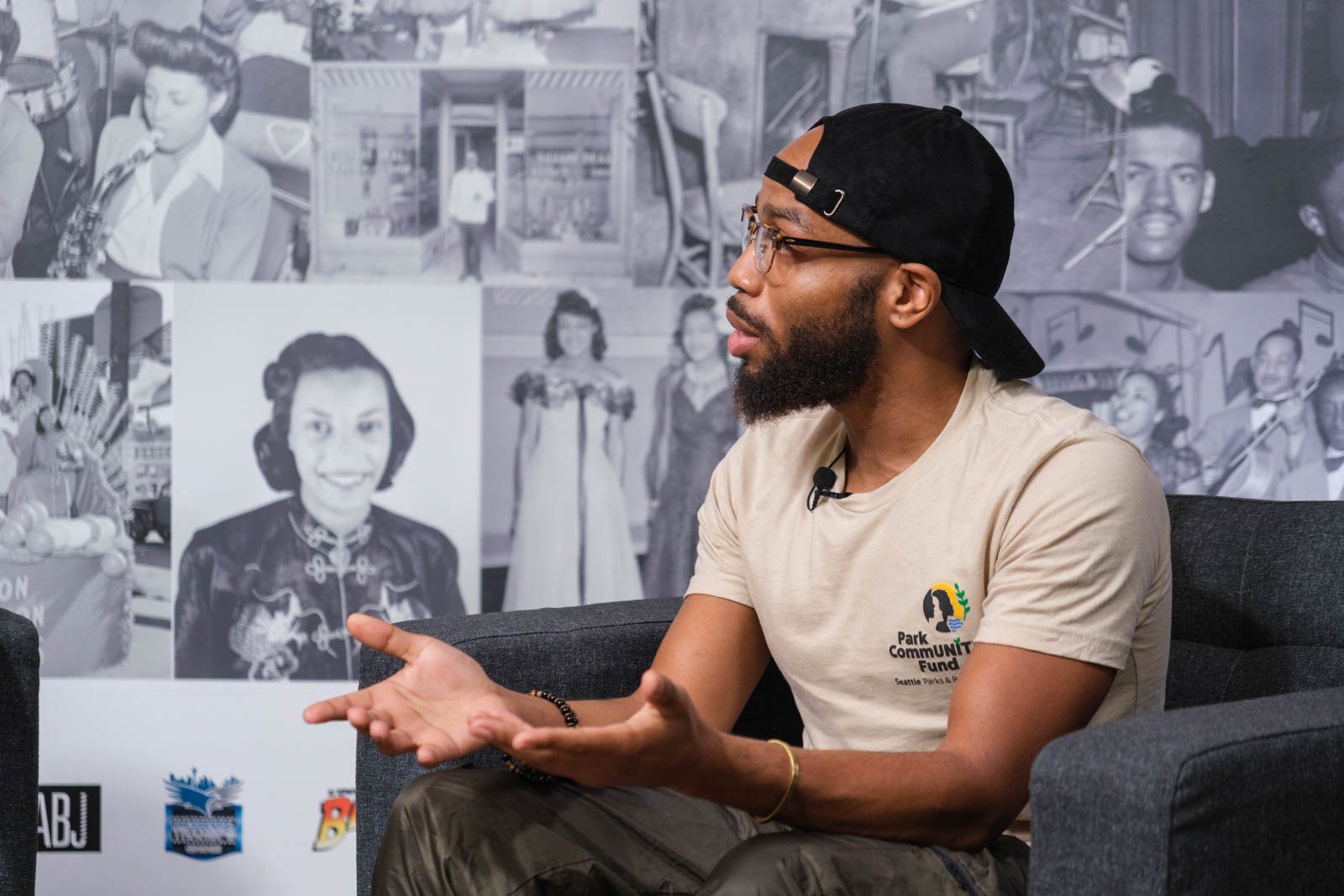Shaquan Smith Talks Empowering Communities Through Seattle Parks and the Park CommUNITY Fund
Photos by Jordan Somers
Shaquan Smith, PMP®, a planner and strategic advisor at Seattle Parks and Recreation (SPR), recently joined Trae Holiday on the set of The Day With Trae. This segment showcased Smith's work within the Department of Seattle Parks and Recreation, shedding light on his initiatives to foster community engagement and environmental stewardship in Seattle Parks.
Hailing from Flint, Michigan, Smith's upbringing was filled with service and connection to the environment. From his formative years volunteering in soup kitchens to his first job as a gardener, his journey led him to the University of Michigan. Upon leaving school, Smith became an urban planner and worked with AmeriCorps on environmental justice and sustainability initiatives within predominantly Black and brown communities in Detroit.
"I thought initially I was going to go and be a landscape architect, but I realized how connected I was to [the] community and doing that advocacy type of work," Smith said.
Upon moving to Seattle, Smith worked initially for the Department of Neighborhoods before moving into his current position, which, as he puts it, is "still community work, but having more focus on the environment."
Some of Smith's current work includes planning for Be'er Sheva Park.
"It's one of my first projects working with parks, and to be quite honest, the most exciting thing is just working with the community," Smith said.
Underscoring neighborhood residents' passion and eagerness for park improvements, Smith highlighted the role of forging city partnerships that enable local residents to actively participate in project implementation.
"Working in the city, we need to realize more and more how we can do more partnerships with [the] community. I think oftentimes, there's a top-down approach, where it's like, 'We're the city, we know what's going on, and we're the experts," Smith said. "I always tell people I'm not the expert, especially when they were doing work with [the] community. The experts are the community, so that's who we should be having as leaders in this work."
One of the vital endeavors Smith is currently participating in is the Park CommUNITY Fund, a groundbreaking initiative centered on community and equitable resource allocation. This initiative entails channeling funding into large and small-sized projects through fair grant allocation practices and participatory budgeting. Echoing Smith's desire for partnerships, the fund has partnered with various regional organizations, including Mary's Place, Rainier Beach Action Coalition (RBAC), Hip Hop is Green, and more, all focused on directing resources towards predominantly BIPOC neighborhoods, which Smith aptly refers to as "frontline communities."
"These are communities that, time and time again, have experienced oppression, colonization, basically have had a history of disinvestment by the city or just by society in general. We want to make sure they're a priority for the work that we do," Smith said.
While acknowledging these communities' marginalized or disadvantaged status is important, Smith emphasized that it is only a fraction of the story.
"Most of these communities are on the front line of making change. So we say frontline like we're standing up and saying they may be marginalized and disadvantaged, but without them, change won't happen," Smith said.
The Seattle Park District has earmarked a substantial $14.8 million from 2023 to 2028, with an initial disbursement of $5.2 million slated for the 2024-2025 cycle. Projects will receive varying scales of financial support, with Smith entailing that smaller endeavors can receive budgets up to $150,000 while more substantial initiatives have funding caps of $1.5 million.
"As long as it's on Seattle Parks and Recreation property, we can do a project there," Smith said.
The pilot cycle is a four-step process that includes program planning/design, project selection, implementation, and evaluation. Currently, the department is in the first step of project collection.
"So during this stage, we go out to the community to solicit ideas, and we have three stages for that: idea collection, product development, and final selection," Smith said. "So idea-collection is happening right now, and people can go and submit ideas, and we're doing that in person or online."
SPR is currently soliciting submissions for idea collection until April 30th, inviting applicants to propose initiatives that address community needs and aspirations. Interested individuals can submit their ideas in person or via the department's website here, where they are prompted to provide details such as the project's name, anticipated impact on the community, perceived need, and desired location.
"We're asking people to submit ideas for what's going on in your community that you would like to see improvements happen. People can participate at their local community center. If you go to your local community center right now, you can submit an idea," Smith said. "There's a ballot box right there at the front desk ready for you to go, but we also have community events that we're doing, and we're doing pop-ups here and there."
To stay update on news happening throughout King County, tune into Trae every weekday at 11 a.m. on all Converge Media platforms and The Day With Trae YouTube Channel.









